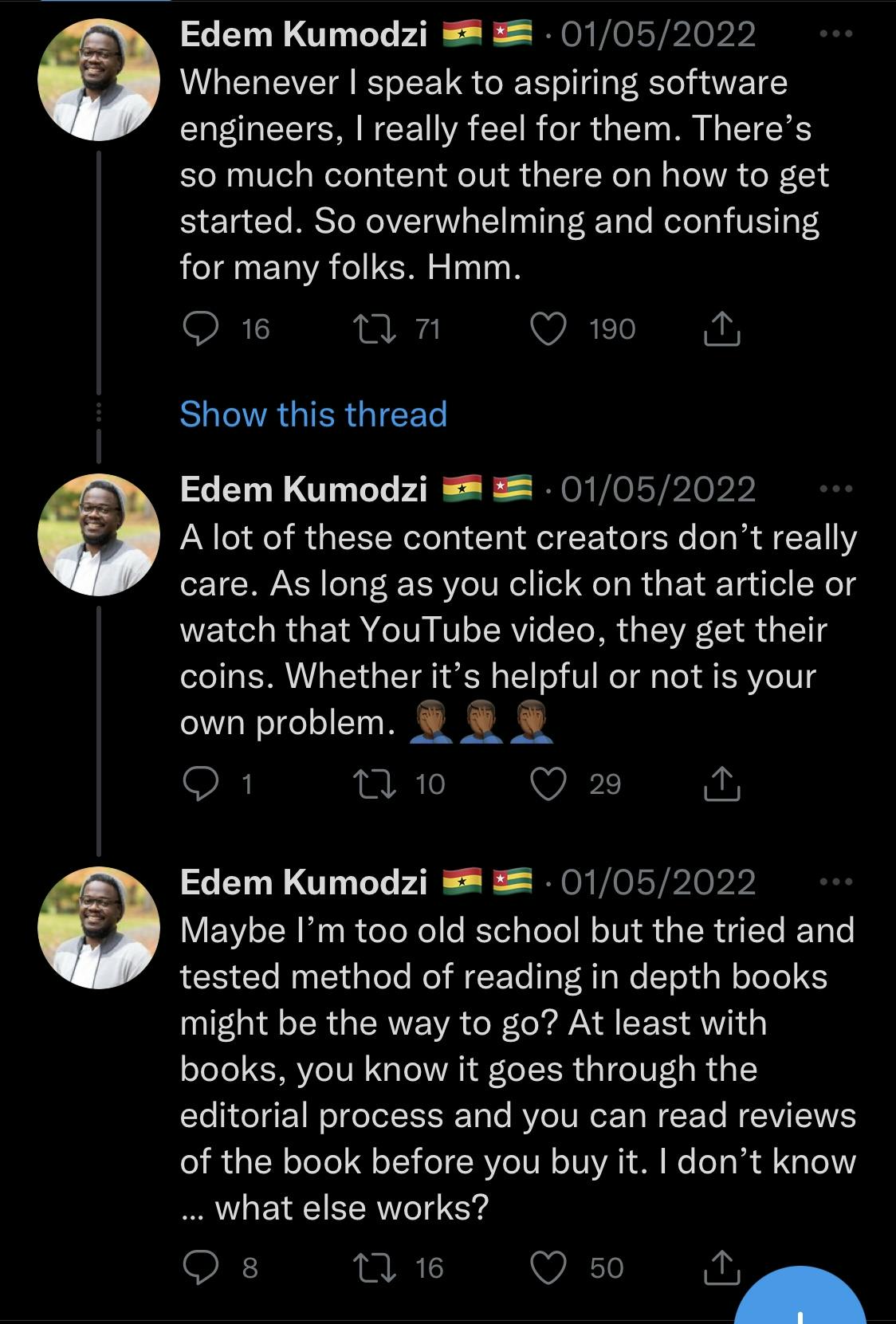How To Transition Smoothly Into Tech And Stay
Making the decision is the easiest, transitioning well enough to stay, is the real deal.
Many people aspire to transition into Tech. Some actually take the first few steps and then fall out. As always, making the decision is the easiest, but ensuring you transition well enough to stay, is the real deal.
Of the four people I transitioned into Tech with, I’m the only one still in the field, a little over two years later. I don’t consider myself lucky, I was just more strategic. As you’d come to learn, when venturing into anything new, strategy is very very important (I wish I could add another ‘very’, but I believe you get the point 😅). Before writing this article, I conducted hours of research to see if there were any new strategies besides the ones I used in 2019. I was quite pleased to learn that nothing has changed. This makes it easy for me to share these strategies by using my own experiences.
In this article, we’re going to discuss five strategies that have been tried and tested and are sure to help anyone transition and STAY in tech.
Warning: It's a long read but worth every minute 👌🏿
1. Find your Why and your Wow, Through Self-Assessment
Just like Simon Sinek, I’m a firm believer in the theory that you can’t succeed in anything unless you start with why. Before you get too excited about starting, take some time to think of why you want to make the transition. And of all the industries, why tech?
This is important for two reasons: first of all, it’ll help you weigh the quality of your reason and secondly, it’ll give you the vision to hold onto when the going gets tough. My initial reason for getting into Tech was to secure a job so I could save up to fund my dream of being a filmmaker. But beyond that, I guess I just wanted to be in a position to support my family.
And it’s those who start with why that have the ability to inspire those around them or find others who inspire them - Simon Sinek
After finding your why you need to take a moment to identify what unique skills you already possess as an individual. I call this your Unique Value Proposition. Mainly transferable skills like attention to detail, interpersonal and communication skills etc. You can identify these by doing a self-reflection, assessing areas where you constantly get good remarks — at work and in life.
Additionally, you can ask a few people who are close to you. This is necessary because it can help you find the exact area in Tech you'll thrive in. Once you list these skills, search online to find what areas of Tech those skills are needed. For example, if you already have great writing skills, you'll easily thrive in Content or Technical writing.
2. Have A Personalized Plan
There’s so much info about almost everything but not everything will work for you. After knowing your why and wow factor, devise a plan or road map of how you’re going to start, what you’ll need when you’re projecting to reach your goal and everything in-between. This is actually the deciding factor for whether a Tech newbie will stay or get frustrated along the line and quit.
Start small and start now. A plan becomes a commitment that you work hard not to break and that keeps you going no matter what. For instance, as a web developer, your plan can be “I will study for two hours every day from 6 - 8 am, I will build a project every weekend from 2 pm -4 pm" etc.
Passion alone can’t cut it. For passion to survive it needs structure. A why without how has little probability of success - Simon Sinek
Once you have a plan, set structures to ensure you follow through to completion. Eg. Get an accountability partner, friend or mentor to help you stay on track. Document your stuff so that you can easily measure your progress and personal improvement. As much as you have to push yourself to get results, prioritize your health and well-being especially mental. What's the point of getting amazing results when you’re not fit. Be kind to yourself, remember that slow motion is better than no motion and celebrate your wins no matter how small.
3. Get Relevant Knowledge and Certification
I came across a very interesting post on Twitter about the abundance of knowledge in the tech field and how it's a big worry, especially for newbies. This is something I actually fell victim to in the beginning, I was always overwhelmed by the plethora of resources available online on every single Tech topic. But as I’d later come to learn, not all of it is relevant.
There are two forms of learning I’d suggest, books and structured courses. If you can afford it, pay for a structured course. Not only does it increase the probability of you committing to it because your money is involved, but you can also focus because you’ll be guided by an expert and get the certification. Bootcamps are also a good way to get started.

It's very true that you can get into tech without any form of certification but once you’re in please try to get certified at least in the one skill you hope to make a career out of. This is because it's one of the fastest ways for a future employer or recruiter to validate your knowledge of a particular skill. On the surface level, the right kind of certification can set you apart from other candidates who have just their words.
When I decided to get into frontend development, I, first of all, got certified in Web Development. Then, User Experience Design and in a few months, I’ll get a final one in Frontend Development. Think about what kind of tech job you want and explore certifications that match up with your career vision.
4. Gain Hands-On Experience
Sometime back, I learnt that Knowledge isn’t entirely power. It’s however the application of the knowledge that has any power. Let’s face it, merely having knowledge of how to prepare the best meal, helps no one till you actually cook. Why get your hands dirty with work? Talk is cheap!
One of the things that you’re bound to discover in this field is that a lot of people are talkers and not doers. However, talking can only get you so far. At a certain point, you would be required to ‘show working’. True, there are a lot of opportunities in Tech but trust me, if you don’t possess the right skills and evidence of experience, the best you’ll get is to read job posts and drool over the huge salaries.
The goal isn’t to be perfect at the end, the goal is to be better than tomorrow - Simon Sinek
A sure way to land tech jobs with no formal work experience in the field is by collecting smaller pieces of experience to demonstrate your skills, this can be in the form of personal projects, internships, volunteer work etc. The aim at this point shouldn’t be the money but the knowledge and experience. Search online and check within your network for any of such opportunities.
I started with an internship which I believe was the best decision I made. At this stage though, make sure to stick to your values and don’t appear too desperate because you can easily be taken advantage of. Look for volunteer opportunities in fields that align with your goals and values, most importantly.
5. Network
You may have heard the quote “Your Network is your Net worth”. Yes, it's true and no, the tech industry isn’t exempted. People will bring you opportunities! I’m a living testimony of the power of association and knowing the right people (I may have to write a separate post to talk about this because I have so many stories 🥺). For the past two years, for ALL the gigs and jobs I’ve had, about 90% of the time it was based on recommendation. This is not in any way to say connect only with people who look like they can help you, because help is relative and come in the most unexpected ways.
Attend Tech meetups or career fairs and be intentional about meeting people for genuine connections. Casually having friends in tech is also very valuable. They won't only support you through the difficult times. They'll also serve as a motivation to constantly stay abreast with emerging technologies. Networking also means you have to put yourself out there. If you're anything like me, that just sent chills down your spine. Use social media to show people what you do. Update your profiles to fit your new endeavour so that others can easily reach out to connect with you. Finally, find a mentor – Get guidance from someone who is trusted and experienced in the industry, someone who you will genuinely be interested in mentoring you and commit to them.
Conclusion
I’ll end with a quote by Seth Godin, "There’s no shortage of remarkable ideas, what’s missing is the will to execute them". Make no mistake, it's going to be a tough journey but nothing is impossible. And is it worth it? Thousand times yes! A lot of people have led the way. This shows that it’s doable but ONLY if you’re committed to putting in the work. At the end of the day, whatever the result you have yourself to blame. So never lose sight of your Why, identify the transferable skills you can easily take advantage of to stand out. Gain relevant knowledge, apply it and if possible, validate your knowledge with a certification. Finally, get hands-on experience and create the right network.
Thanks for reading 👋🏾. I hope you found this helpful.
